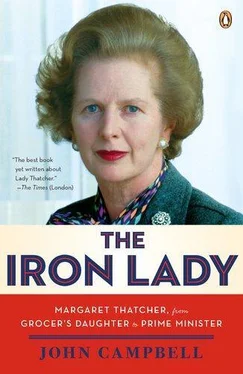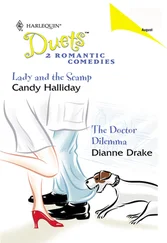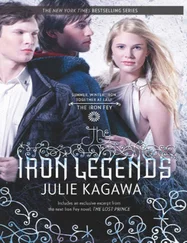This utilitarian attitude to literature was reinforced by her education. At school she specialised in science, went on to read chemistry at Oxford, and then took up law. From Oxford onwards she devoted most of her spare time to politics. As a result she never had much time to enlarge on her youthful reading. What she read and learned in her first eighteen years, under her father’s influence, remained the bedrock of her literary education. In this sense it is literally true that she learned ‘almost everything’ from her father. She always insisted that the most important lesson he taught her was to follow her own convictions. ‘Never do things just because other people do them,’ he told her when she wanted to go dancing. 11‘Make up your own mind what you are going to do and persuade people to go your way.’ 12‘Never go with the crowd,’ she paraphrased his advice in 1982. ‘Never, never, never.’ 13The paradox, of course, is that she went on, with no sense of contradiction, to pride herself on taking all her ideas from him. ‘He brought me up to believe all the things I do believe and they are the values on which I fought the election.’ 14
It is a curious thing for a strong-minded woman to proclaim in this way her debt to her father, as if she was no more than his echo. In fact she exaggerated the extent of her fidelity to Alfred’s teaching – presumably to divert attention from the important respects in which she had abandoned it. Once she had got away from Grantham and embarked upon her own career she quickly adopted a style of life and political values a world away from his spartan ethic. Symbolically, she abandoned her parents’ church and gravitated to the Church of England. She gave her own children an upbringing as different as possible from the puritanical austerity she always claimed had been so good for her. Mark and Carol were not made to go to church, she told Patricia Murray, ‘because I’d had so much insistence myself ’. 15‘There was not a lot of fun and sparkle in my life,’ she told an audience of children in 1980. ‘I tried to give my children a little bit more.’ 16An alternative interpretation is that Mark and Carol were smothered in material comforts in guilty compensation for their mother’s absence, for most of their childhood, in pursuit of her political career.
Yet clearly much that Alfred taught his daughter did go into the forging of her creed. The political personality that Margaret Thatcher became was moulded by her upbringing. Essentially she took three things from her father’s example. First, it was Alfred who instilled in her the habit of hard work, as something both virtuous in itself and the route to self-advancement. Second, it was the example of Alfred’s tireless community activity which bred in his daughter a powerful impulse towards public service. The third, and perhaps most important, legacy which Alfred gave his daughter was an exceptionally powerful moral sense. More than anything else in her political make-up, it was her fierce confidence that she knew right from wrong – even if what was right was not always immediately attainable – which marked Margaret Thatcher out from contemporary politicians. She believed absolutely in her own integrity and habitually disparaged the motives of those who disagreed with her. This rare moral certainty and unreflective self-righteousness was her greatest political strength in the muddy world of political expediency and compromise; it was also in the end her greatest weakness.
The most extraordinary thing about Mrs Thatcher’s mythologisation of her father is that it was entirely retrospective. Having once escaped from Alfred at the age of eighteen she saw very little of him for the remainder of his life. In 1951 she took her fiancé to meet his prospective in-laws. Alfred Roberts and Denis Thatcher had nothing in common. Once they were married, Margaret and Denis went back to Grantham very rarely. When Beatie died in 1960, Alf remarried – a local farmer’s widow called Cissie Hubbard, with grown-up children. ‘I suppose that’s a good thing,’ Margaret witheringly confided. ‘She’s a nice homely little woman.’ 17He lived until February 1970. He was proud of his daughter being a Member of Parliament, and was said to have been listening to her on a radio discussion programme just before he died. But he did not live quite long enough to see her in the Cabinet – though, curiously, she believed he did. 18Perhaps she was thinking of the Shadow Cabinet; but her mistake suggests that he did not share very closely in her triumphs. He had only a graduation photograph of her in his house: nothing more recent, and no pictures of his grandchildren. 19Mark and Carol were sixteen when Alfred died, yet appear to have little memory of him. The impression is inescapable that Margaret was very much less devoted to her wonderful father while he was alive than she became to his sanctified image after he was dead.
The key to Margaret Roberts’ escape from Grantham was education. Her formal schooling began a few weeks before her fifth birthday, on 3 September 1930, at Huntingtower Road County Elementary School, reputed to be the best council school in Grantham. According to her own account she could already read by the time she went there, and she quickly moved up a year. She was already formidably diligent and competitive. At the age of nine she won a poetry recital competition at the local music festival When the head congratulated her, saying she was lucky, she denied it indignantly: ‘I wasn’t lucky. I deserved it.’ 20She would always believe that if she worked hard she would deserve to win. The following year, when still only ten, she won a scholarship to the fee-paying girls’ grammar school, Kesteven and Grantham Girls’ School (known as KGGS), where her sister Muriel had already gone before her.
In fact Alfred paid Margaret’s fees too, since the scholarship was means-tested; it was nevertheless a useful insurance, and a considerable achievement.
Her reports give a clear picture of her character. At Christmas 1936 she was said to have ‘worked steadily and well throughout the term. She has definite ability, and her cheeriness makes her a very pleasant member of her form. Her behaviour is excellent.’ The following July she won praise for ‘neat and careful work’. The next year she was ‘a very helpful member of her form’ and ‘achieved a high standard in every subject’. In her fifth year (the summer of 1941) she sat her School Certificate: she passed well in all subjects, but her methodical approach naturally directed her towards specialising in the sciences.
An interest in chemistry was not something she derived from her father, nor was it the most obvious subject for a girl precociously consumed by current affairs; later, when she had set her sights on a political career, she regretted having been sidetracked into science. At the age of sixteen, however, chemistry was her best subject. It suited the practical bent of her mind, and – most important at that age – she liked her teacher. It was a sensible subject, leading to good employment prospects.
Margaret was not quite fourteen when the war began, nearly twenty when it ended; it overshadowed her entire adolescence and was overwhelmingly the formative influence on her political development and specifically her approach to international relations. She came to political awareness in the mid-1930s at just the moment when international crises – in Abyssinia, the Rhineland, Spain and Czechoslovakia – began to dominate the news. Her first political memory was the so-called ‘Peace Ballot’ organised by the League of Nations Union in 1934.At a time when most Methodists inclined towards pacifism, Alfred appears to have been exceptionally aware of the threatening European situation, convinced of the need for rearmament to resist Nazism, and also – more unusually – concerned about the plight of the Jews. In 1938 the Roberts family briefly gave sanctuary to a seventeen-year-old Austrian girl – the penfriend of Margaret’s sister Muriel – sent to England by her parents to escape the Anschluss . She did not stay long – Alfred persuaded other Rotary families to take her in turn – but she brought the reality of what was happening in Central Europe home to North Parade.
Читать дальше












